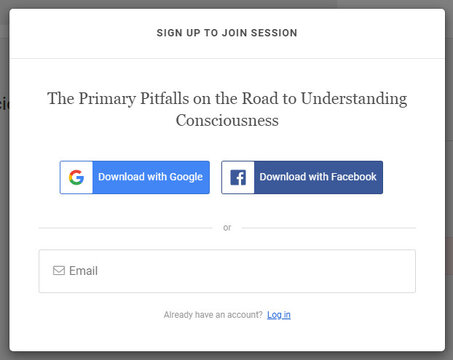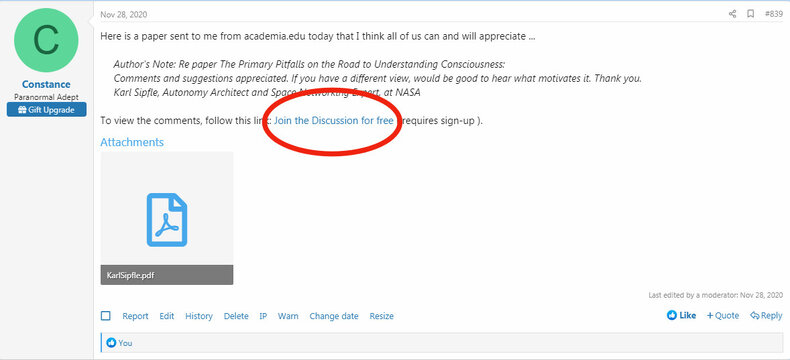You may have been aware of this all along, but something I realized while reviewing the video you posted, is that biosemiotics doesn't require, or at least shouldn't require or assume, that consciousness is present in all cases where the "signs and signals" that the field considers relevant are present. They could simply be acting as causal agents for purely biomechanical reactions.
I think this is a fair question.
I think biosemiotics and its “signs and signals” is important as is illustrates how “information processing” (signaling) in the brain is an abstraction for a purely biological process of neural cells interacting with one another and the natural environment.
The point Randall makes is the same that has come up time and time again. The hard problem. What makes some information processing in the brain conscious and some information processing nonconscious? Or, if one prefers, why are some neural cell activations conscious and some not? Or why does consciousness “accompany” some neural cell activations. Or how do some neural cell activations cause consciousness to strongly emerge?
The following paper outlines this question very carefully and attempts to address it.
“
i-consciousness and m-consciousness
Studying consciousness scientifically is difficult when the word has multiple meanings. For clarity, we begin this account by labelling two common
categories of meaning for consciousness. The first focuses on information in the brain—how it is selected, enhanced, and processed. The second is a more mysterious, extra, experiential essence that people claim accompanies the informational content. In this account, we will refer to the two as i- consciousness (i for information) and m-consciousness (m for mysterious), although we acknowledge that other researchers may use different terminology. The primary reason for using this two-part terminology is to make it as clear as possible that, in our perspective, at least some form of consciousness exists. We do not argue that consciousness is entirely an illusion or a mistaken construct. Rather, i-consciousness literally and mechanistically exists within us. Somebody is home. We can then debate whether m-consciousness, the more ethereal notion of consciousness that people intuitively believe they have, is accurate or instead is an imperfect model of i-consciousness.
Presently, the most generally accepted theory of i- consciousness is probably the global workspace theory (GW) (e.g., Baars, 1988; Dehaene, 2014; Dehaene & Changeux, 2011; van Vugt et al., 2018). In it, if you look at an object such as an apple, as the visual information is processed in a complex set of brain areas, the signals related to the apple may win an attentional competition, growing in strength and consistency. With sufficient attentional enhancement these signals may reach a threshold where they achieve “ignition”, which means that they dominate the larger, brain-spanning networks, especially net- works across the parietal and prefrontal cortex. The visual information about the apple becomes available for systems around the brain, such as speech systems that allow you to talk about the apple, motor systems that allow you to reach for it, cognitive systems that allow you to make high-level decisions about it, and memory systems that allow you to store that particular moment for possible later use. In that circumstance, the visual information about the apple has entered the global workspace and thus entered consciousness, whereas the vast majority of other information in the brain has failed to reach the global workspace and thus remained outside of consciousness. In our per- spective, though others may disagree, GW is an account of i-consciousness. It is about how select information reaches a state in which it is bundled cen- trally and can impact output systems. A global work- space is computationally buildable (Baars & Franklin, 2007) and can be studied objectively even in non- human animals performing detection tasks (e.g., van Vugt et al., 2018). One way to summarize the theory is that i-consciousness is associated with the highest levels of attentional enhancement in the cerebral cortex.
Explaining i-consciousness, however, is only part of the challenge.
In a traditional perspective, in addition to the content of consciousness, we have something else, something that accompanies the information, or imbues it, or in some manner is the essence of experience. [see Randall’s concern above.] The challenge of explaining conscious- ness, in this traditional perspective, lies in explaining the extra essence—subjective awareness, or m-con- sciousness as we label it here.
The idea of a distinction between the information contained in consciousness, which can be understood through materialist theories such as GW, and the extra, non-materialist property of subjective experience, emerged mainly during the twentieth century, possibly as a result of the rise of information technology. Without a well-developed concept of an information-processing machine, it is difficult to realize that the information in the mind might be different from the experiential essence of the mind. For example, William James (1890) essen- tially conflated the two, coining the term “stream of consciousness” to describe the ever-changing mental content. Even at the start of the computer revolution, when Turing (1950) wrote about whether a machine can think, he emphasized the processing of infor- mation and not
whether the machine can have a sub- jective experience of that information. But within a few decades, Nagel (1974) argued that it is not enough to process information. There is a non-materi- alistic component, a “what it is like” to experience something. It is non-physical in the sense that one cannot touch it, weigh it, or snap it in half and measure its tensile strength, but Nagel argued it exists nonetheless. Chalmers (1995) refined the idea, referring to the easy problem of scientifically figuring out how the brain constructs the content of conscious- ness and the hard problem of figuring out the nature of subjective experience itself.
As a result of these ideas, for the past twenty-five years, consciousness has been widely viewed as containing two parts. Whereas i-consciousness can be understood mechan- istically and can probably be replicated by machines, m-consciousness is considered difficult or impossible to explain.”
Is m-consciousness the intrinsic nature of energy/matter, is it something new that strongly emerges from energy/matter, is it an illusion, or something else altogether?
@Pharoah Im still curious how HCT handles reports of subjective experiences evoked via direct brain stimulation in the absence of normal environmental stimuli.



